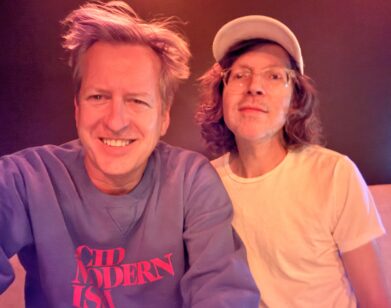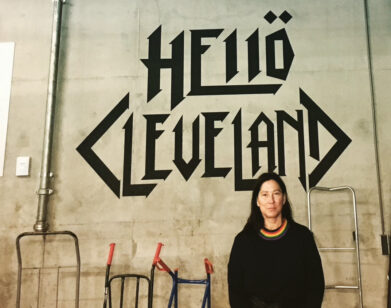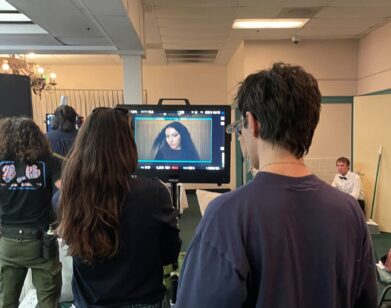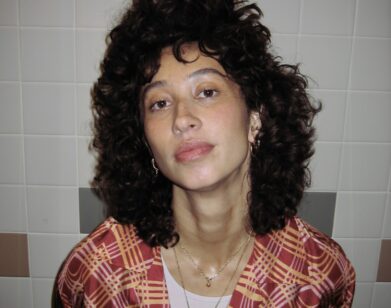The League of Extraordinary Circumstances
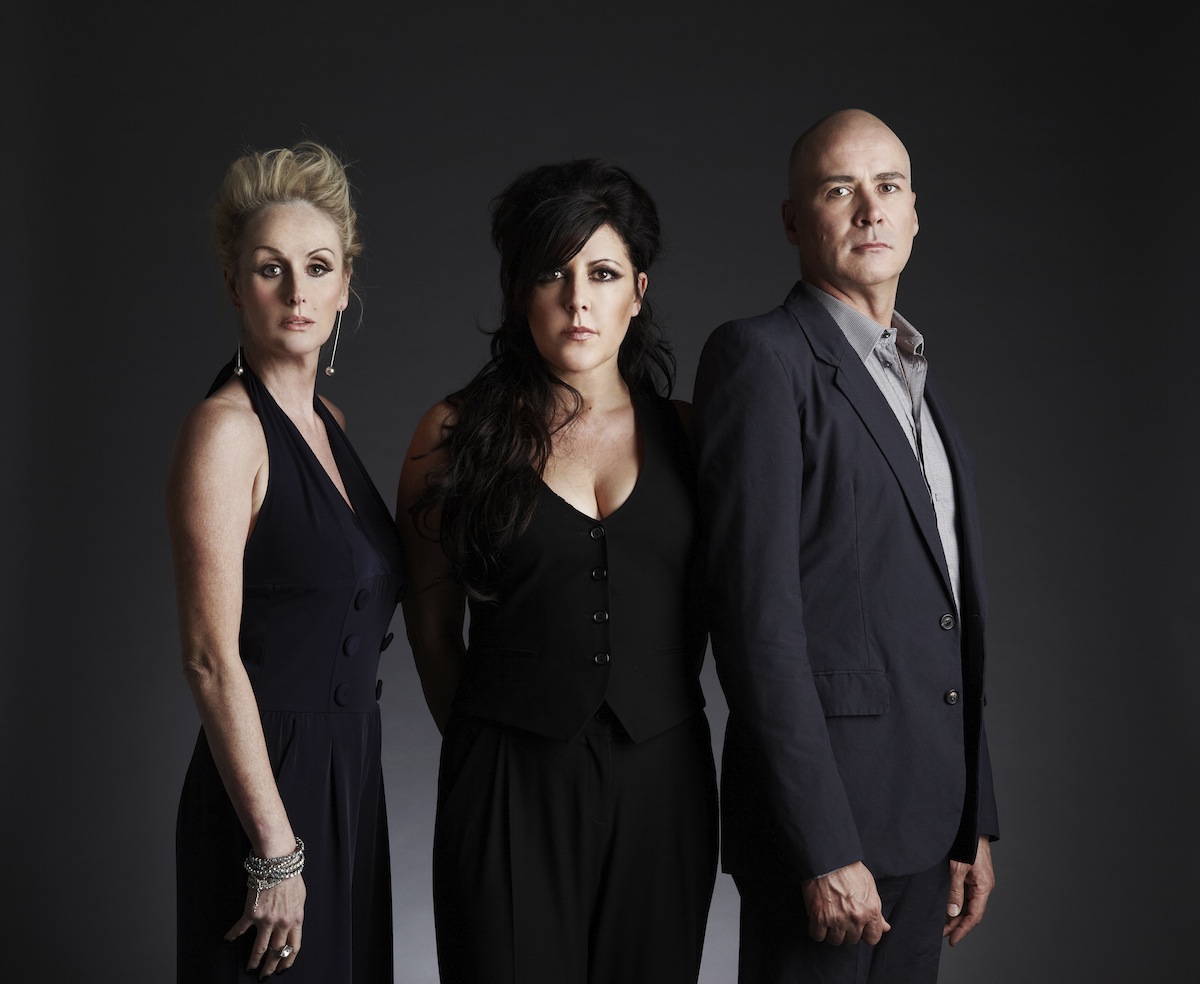
THE HUMAN LEAGUE. PHOTO COURTESY OF SPIROS POLITIS
They’re back! Electronic synth-pop trio The Human League returns today with the physical release of their ninth record, Credo, the first in a decade. The Sheffield-born, bred, and based threesome, comprising Philip Oakey, Susan Ann Sulley, and Joanne Catherall, have been making music together since 1980—and Oakey even longer, having begun in the band in ’77. Since that time, they’ve seen their share of ups and downs, but this disc proves that only time will tell. It was once thought that Dare was the standout album, but there have been murmurs that, 30 years later, this one tops it.
Indeed, this 11-track time machine is startlingly sparkling. Kudos to “Oakey and his ‘dancing girls.'” With a number of excellent tunes, including “Never Let Me Go” and “Breaking the Chains,” it’s no wonder that in 1979 David Bowie dubbed them “the sound of the future.” This in addition to influencing myriad musicians over the course of their career, from Madonna to Moby, La Roux to Little Boots. They were ahead of their time then and are in stride with the times now.
Last week while bussing about California, from Lincoln to Saratoga, between dropped calls, Sulley shared a few things with Interview, including the fact that this isn’t the buzz-worthy event everyone’s making it out to be. Says she, “We never went away!” By this she means the outfit never stopped touring, but who is she kidding? An album comeback after ten years is something to celebrate.
Read on to hear from the icon herself how ordinary their lives are, how absolutely mad record label legend Mark Jones is, and how even Lady Gaga doesn’t get special treatment.
NELL ALK: Congratulations on Credo! How does it feel to be back after a decade?
SUSAN ANN SULLEY: It feels great. But, to be truthful, we never went away. We never stopped touring. We’re in America at the moment and in the last ten years, this is the third time we’ve been to America. We’ve always been around and doing stuff. It’s just the first time we’ve got an album out in ten years.
ALK: Which is something to celebrate, no?
SULLEY: We tour and we make records. Sometimes we leave long gaps in between them. It’s just what we do. We enjoy the process of touring. We enjoy the process of making records.
ALK: Okay, okay. Well, fans are excited! Now, I realize you’ve only just started to tour the US this time around, but what’s been the highlight so far?
SULLEY: It’s the second time we’ve headlined the Hollywood Bowl, and both times we sold it out. We’re just a load of bozos from Sheffield and we just played one of the most iconic venues in the world. That’s always a great thing. We’re really happy.
ALK: Sounds like the good life. Could you have pictured this success when you were just a girl?
SULLEY: I don’t think any of us thought that we’d either, A, be in a pop group or, B, that the pop group would last as long as it has. I’ve been in the group 31 years and Philip’s been in it for 34. I don’t think any of us expected that to happen. [Joanne and I] were just lucky we were in the right place at the right time.
ALK: I’ll say.
SULLEY: Philip never asked us to join, he just asked us to tour with them. We ended up getting on and we joined in when they were making the album and we stayed around. The good thing is that we never really wanted to be in a pop group. We never wanted to be famous. We just liked the music. And I think that’s kept us grounded. We’re not interested in the celebrity side of anything. We just like getting on stage and doing what we’re good at.
ALK: I can imagine. So what’s life like when you’re not on the road?
SULLEY: I think we have a completely normal life. As soon as we’re at home in Sheffield, I’ll be at the supermarket, Philip will be walking his dog, Joanne will be looking after her son. We live a very normal life. We’ve always stayed in Sheffield. Everybody knows us, so no one takes any notice of us. We live a very, very ordinary life. I think that’s one of the great things about the travel. One day I am at home in Sheffield, the next day [I’m] playing the Hollywood Bowl. It’s extraordinary.
ALK: Despite the self-proclaimed ordinariness of your day-to-day life, what’s it like to be considered an influential icon in the eyes of not only fans but also respected peers in the music industry?
SULLEY: I think the thing about music is, it’s about communication. If you communicate to anyone, whether someone [unknown who’s a fan] or Lady Gaga, I think that always gives you a nice feeling. It’s always nice when people say nice things about you. But we tend to think about people as equals. It’s great when famous people say they like it, [but] Philip went to Target this morning to have a wander ’round and a guy ran up to him and said, “I went to see you last night and you were fabulous!” It made Philip’s day! Whoever says it to us, we’re always happy.
ALK: That’s awesome. On that note, I love the record. I think it’s fabulous. How did it come about, after ten years?
SULLEY: [Philip] said, “I’m going to start writing some new stuff.” He started working with our drummer Rob [Barton]. Originally it was going to be a Philip solo album. Joanne and I were going to have nothing to do with it. And then Philip [said], “I need you and Joanne to do vocals. It doesn’t feel right.” Then we all just went into the studio and did it and that’s how it all came about really.
ALK: Worked out well. And you had some help. Can you tell me more about working with the infamous Mark Jones?
SULLEY: Mark is mad as a hatter. But, he’s great. He’s really, really into music. I know he’s married and he’s got two wonderful children, but his life is music. And he’s very clever with it. It was he who put us with all the right people to do all the remixes for this new album. It’s testament to him that this album ever came out. We were just going to do it ourselves but Mark wanted to be a part of it. He’s mad. He’s mad about music.
ALK: Have you ever had the opportunity to see him sport the pink bunny suit? I was with him when he was in New York celebrating the 15th anniversary for Wall of Sound and he busted it out at Ace Hotel, then made some poor record exec wear it around at (Le) Poisson Rouge.
SULLEY: We’ve seen pictures of it. I’ve never seen him in it. He’s always in pink, though.
ALK: [laugh] Gotta love it. So, why Credo?
SULLEY: It’s supposed to be a sort of homage to Roxy Music. When they split up, Philip was really upset. When they [got] back together, the album they [released] was [called] Manifesto. And it was like, “This is what we’re trying to say. This is what we believe in.” And Credo was the word that we [equated in our own way] to Manifesto.
ALK: I like that. Bryan Ferry should be flattered. You’ve come a long way since Bowie defined The Human League as “the sound of the future.”
SULLEY: To be very fair, it was Ian Marsh and Martyn Ware who started The Human League. They brought Philip in to sing, primarily because Philip was very tall. So it started out as their vision. I don’t think anyone ever thought it would be as big as it became. Music evolves and people were looking for something different. We came out at the right time and were just very lucky.
ALK: Totally. It’s great that you’re so humble. What’s your stance on music today? You’ve witnessed firsthand how it’s evolved and, in some ways, regressed. Any thoughts on that?
SULLEY: The whole music industry has completely and totally changed from how it was. It’s very, very different. When we started, there were loads of record company people throwing money at [musicians], and that did give people a long term career. I think [for] a lot of new bands, although they have a lot of opportunity, [this business is] not giving them a long-term career. I think there’s some terrible stuff that comes out and we are bombarded by likes of The X Factor, Pop Idol and all those programs that I don’t really like and I don’t approve of. But then there are other people coming out now, like Adele, people who are making their own music, doing their own stuff. That’s a good thing. I think that music’s okay. I don’t think we need to worry about it.
ALK: I have indeed heard you’re not a proponent of reality TV talent shows…
SULLEY: I understand why people do it, I just don’t think it’s good for music. It’s karaoke. What three people on a panel perceive as being great vocally, I think, [isn’t] necessarily right. The likes of Bob Dylan and David Bowie and probably Elvis Presley or any of the Beatles, none of them would have got through Pop Idol, because they’re not conventional. They’re not what people think is popular now. I like the [individuality] in people. I don’t want everyone to sound the same.
ALK: The Human League might not have made it…
SULLEY: No. None of us. Absolutely none of us. We wouldn’t go in for it. I think a lot of people go in because they want to be famous and not because it’s about the music.
ALK: Absolutely. Lastly, one outlet recently called Credo “The first truly consistent [Human League] album,” and better than Dare. What’s your reaction to that?
SULLEY: I don’t know. You’re in music, you make albums. It’s a Human League album. We sound like The Human League. We’re never going to sound like anybody else. We sound like us. Philip’s vocals, mine and Joanne’s and some synthesizers and some drum machines. We are The Human League. We sound like The Human League.
THE HUMAN LEAGUE’S NEW LP, CREDO, IS OUT NOW. THE BAND WILL CONTINUE TO TOUR, INCLUDING FRIDAY, SEPTEMBER 23, AT BEST BUY THEATER. FOR MORE ON THE BAND, VISIT THEIR WEBSITE.


